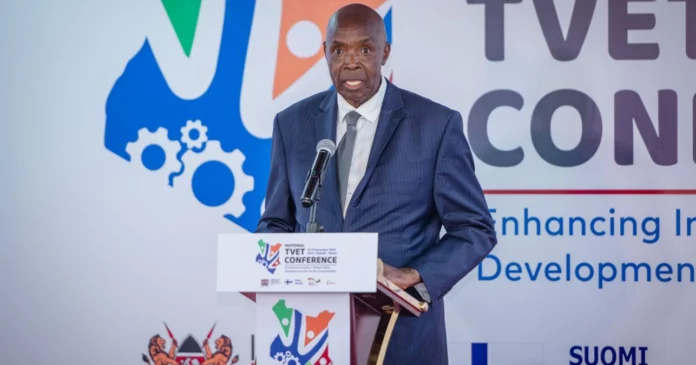During the inauguration of the National TVET Conference 2023 at Nairobi’s Kenyatta International Convention Centre (KICC), Education Cabinet Secretary Ezekiel Machogu delivered a recent address. He expressed optimism for the Technical Vocational Education Training (TVET) sector and affirmed its progressive trajectory towards establishing a robust and strong industrial linkage. His commendation aligns with recommendations set forth by the Presidential Working Party on Education Reforms (PWPER).
Emphasizing the importance of dual training and robust industrial linkages, Machogu underscores these initiatives’ role in equipping learners with practical skills essential for success in today’s job market. The German and Finnish Governments, along with international partners from both the private sector and governmental bodies, have collaborated to implement the Dual TVET initiative; a clear testament to their commitment towards providing a comprehensive education.
Machogu’s address underscored a crucial imperative: the demand for intensified communication between industries and TVET institutions concerning curriculum development. He emphasized not only ongoing, elaborate dialogue but also its collaborative nature; it is an essential tool to foresee future market needs and address them collectively.
CS Machogu urged: “Industries and TVET institutions should establish elaborate communication and robust linkage; this will enable them to scan, discern future market needs, and co-develop the curriculum.”
Machogu’s speech underscored the government’s central theme: its reliance on the TVET sub-sector to propel industrialization in Kenya. With an affirmation of unyielding support, he expressed that it stands ready, fully backing this sector to accomplish all set objectives.
The Chief Secretary remarked: “The government is placing its bets on Technical and Vocational Education Training (TVET) to catalyze industrialization in Kenya.”
The Principal Secretary for the State Department for TVET, Dr. Esther Thaara Muoria – in echoing Machogu’s sentiments and emphasizing the need herself – advocates that TVET institutions must forge strong, seamless collaborations with industries.
“Dr. Muoria asserted: ‘The industry and TVET institutions ought to synchronize so seamlessly—so indistinguishably—that discerning any disparity becomes an impossible task.'”
Dr. Muoria underscored the commitment to a pragmatic educational methodology, emphasizing how nationwide TVET institutions have adopted and executed the Competency-Based Education and Training (CBET) curriculum. This program—equally distributing its focus with 50% on theory and 50% on industrial practice—strives for producing graduates endowed with both theoretical knowledge and practical skills.
Dr. Muoria emphasized the need for the effective delivery of the CBET curriculum, citing the successful retooling of trainers from the old 11 national polytechnics; indeed, this was significant—on November 13th to be precise: The Kenya School of TVET and State Department for TVET launched an eventful retooling program at their newly elevated institutions.
